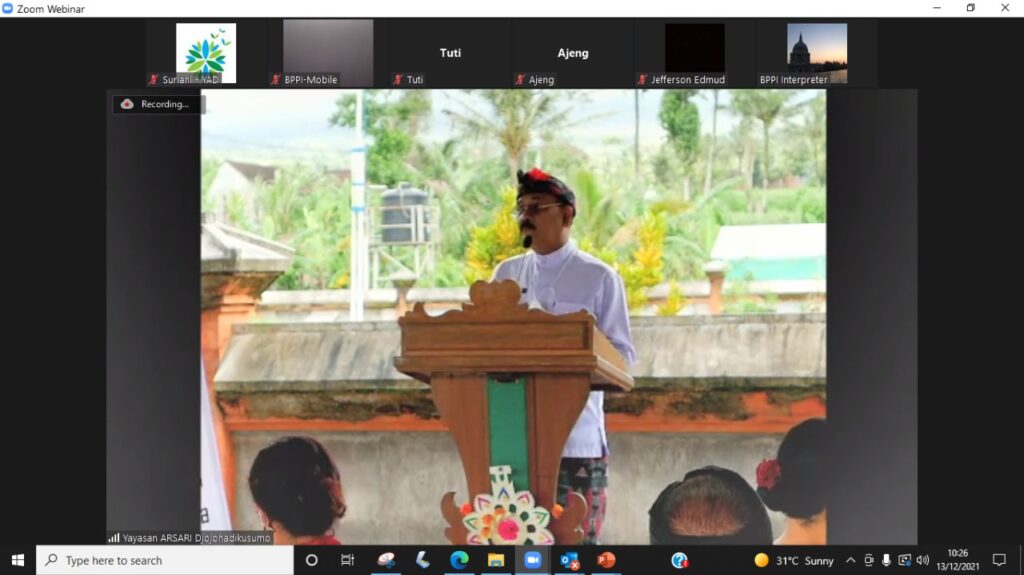Young Generation and Subak Conservation
Selat Village, 13 December 2021. Surrounded by greenery and refreshing scenery at the foot of Mount Agung, a group of youths taking turns sharing their thoughts and suggestion on conservation of Subak, a cultural landscape of Indonesia and one that has been recognized as a World Heritage. These youths are participants of Bali International Field School for Subak (BIFSS), a field school organized by the Indonesian Heritage Trust (BPPI) and Bali Kuna Santi Foundation since 2015.
BIFSS in 2021 explored the theme “Role of Youth in Building Sustainable and Resilient Subak”, aiming to provide platform and opportunity for young generation to tackle challenges faced by Subak. Due to social restriction from covid-19 pandemic, the event was held offline with strict adherence to pandemic protocol with limited participants from local university students to professionals from multiple disciplines who are concerned about Subak sustainability, and also incorporated an online event at the end to share the results of this field school to the public.
Together with lecturers and students of Warmadewa University, the event opened on December 11th with remarks from representatives of BPPI, Warmadewa University, and Bali Kuna Santi Foundation at Wantilan Jero Tumbuk, Selat Village. Participants then received materials from subak and conservation experts such as Prof. Wayan Windia, Dr. Gede Sedana, Dr. Agus Kurniawan, Kadek Windy Candrayana ST. MT, Erick Triswandana ST. MT, dan Ir. Cok Agung Yujana MT. Different aspects and perspectives about Subak conservation from these experts are then summarized by participants to form mapping of the heritage.
The second day of BIFSS was about onfield activities: exploring villages, water reservoir, irrigation canals, Subak and Village Temples, as well as dialogue with farmers and Subak Selat administrators. With these, the participants divided into three groups, “Traktor” (Tractor) Group, “Arit” (Sickle) Group, and “Cangkul” (Hoe) Group to prepare Subak mapping and compiled materials for Subak awareness campaign.
The last day on December 13 was attended by the Regent of Karangasem who appreciated Balinese Cultural Arts by local artists at Jero Tumbuk. As the highlight of the event, participants presented the results of their observations and ideas they achieved in the entire field school in front of stakeholders present at the location, as well as the audience who in the virtual zoom meeting.
“Cangkul” Group comprised of professionals from different fields to conduct cultural mapping about Subak at Selat Village, as well as observing cultural resources such different professions in the village, ritual and traditions embraced the villagers and the relationship with Selat history. This group proposed a comprehensive cultural mapping program with young generation at its drive, to produce a map to serve as a reference to develop the potentials lie in Selat Village. While “Traktor” and “Arit” groups who are mostly comprised of Civil Engineering students presented the results of physical borders of Subak, as well as observation of infrastructures both traditional and modern. They also identified challenges including plastic waste threatening to block irrigation and the need to repair infrastructures such as road access, and their solutions such as waste bank and cooperation with local government to improve infrastructure.
The entire series of Subak field school concluded with awareness from everyone involved that even though Subak at Selat Village is still in ‘safe’ zone, if these problems are not addressed immediately, it’s entirely possible that Subak at Selat Village may face similar fate with other areas. Understanding, awareness, and finally real action from every stakeholder, young and old, is needed to ensure the conservation of this important world heritage closely related to our everyday human life.





